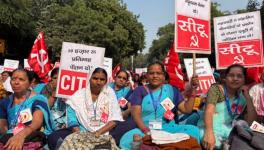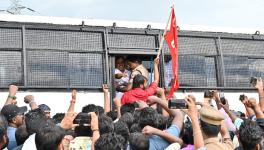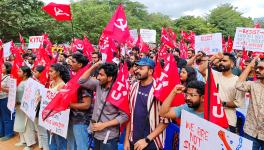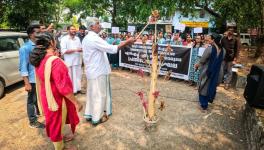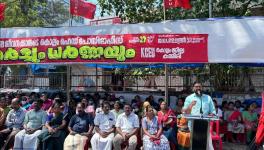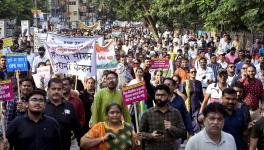To Attract Investment, Govts Ready to Give up on Labour Laws: Pramod Pradhan
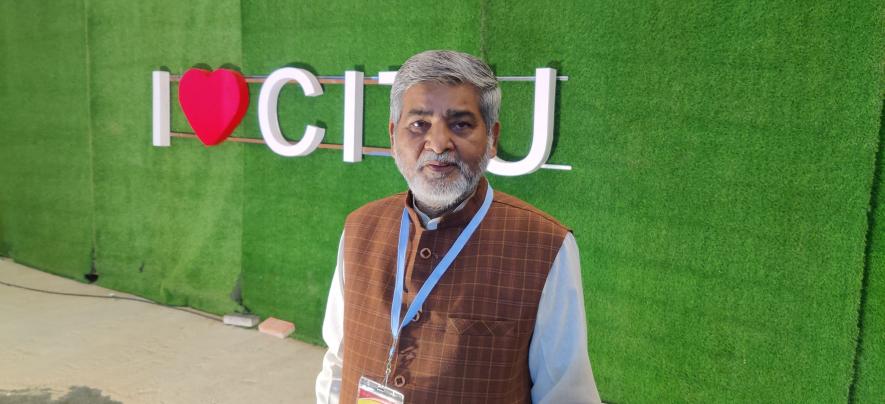
Pramod Pradhan.
On September 19, 2022, Manish Shukla, CITU leader in a cement factory in Maihar was brutally murdered. The police arrested nine people in the case and alleged that the cement factory executives paid Rs 10,000 to three men to carry out the killing. NewsClick spoke to Pramod Pradhan, the general secretary of CITU Madhya Pradesh, on the sidelines of the 17th All India CITU conference in Bengaluru. He spoke about Manish Shukla and the activities of CITU during the covid-19 pandemic.
NC: What do we know about the murder of Manish Shukla?
Pramod Pradhan: He was a very young CITU leader. Around four years ago, he contacted us. He was working in the cement industry. Rewa-Satna region is a cement industry belt. The KJS Cement factory in Maihar had hired many young workers, all of whom were contractual employees. In fact, all 700 workers in that company were on fixed-term employment. When we went there for meetings, it felt like we were attending a student body meeting in some college. They were worried about their future. So they made a union and many workers in that factory joined the CITU union. The management was worried about this. During the Covid-19 lockdown, they decided to cut the wages of workers. However, the unionised workers fought against this and ensured that the workers were paid 80% of wages even when the factories were closed. On September 18, 2022, there was a workers' conference. Manish Shukla was already the president of the cement factory union and was also elected as the vice president of the CITU divisional union. The next day he was murdered.
When he was returning home from work, he was attacked by goons hired by the company management. He was admitted to a hospital with serious injuries. He died three days later. It was revealed that the factory's HR head and vice president had conspired to have him killed. Around 9-10 people were involved in the murder. Within seven days, the Police made the arrests and the revelations. A few members from a rival union were also involved. Maybe they felt their existence was threatened, so they had him killed.
NC: Can you speak about some of the recent activities of the CITU union in Madhya Pradesh?
Pradhan: During the covid-19 pandemic, many factories were laying off workers. We took out many rallies and even gheraoed the collector’s office. The Anganwadi and Asha workers held demonstrations for wage revision and the distribution of safety equipment to all essential workers. We held agitations along with transport workers because all the work had stopped during the lockdown and there was a lot of uncertainty among the workers.
NC: How many unions are affiliated with CITU in Madhya Pradesh?
There are 96 registered unions in MP. The largest unions are of Anganwadi workers, medical sales representatives, coal workers, cement factory workers and Asha workers. Apart from CITU, no other union is able to organise workers during this period of crisis. The CITU conference is a very important one for the trade union movement. On April 5th, we are going to march to Parliament. It is going to be a big agitation.
NC: Is the Bhartiya Mazdoor Sangh (BMS) a strong union in Madhya Pradesh?
Pradhan: BMS is affiliated with the RSS. RSS has not only a communal agenda but also an agenda of dividing the working class. When the BJP brings in neoliberal policies, we should not expect BMS to fight against it. They claim that they have the biggest union, but their registration and verification process is sketchy. They take voter lists from villages and just add their names to show them as members. This is fake membership. Whether they are truly strong or influential depends on their activities. But they are not raising their voice on any issue.
NC: What are the key challenges you face in the current economic crisis?
Pradhan: In the restructuring of industry, the concept of ‘permanency of job’ is over. In all industrial units, the maximum number of workers are contract workers. This is happening in both the public sector as well as the private sector. Legally, the principal employer is responsible for ensuring that contract workers receive their entitlements. But they just wash their hands off this and say that the contractor is responsible. The unemployment caused by the present crisis is making it harder for people to survive. The workers are aware of their rights being denied but they are worried that they will be in a worse situation if they lose their present job. This uncertainty presents a challenge for unionising. This work requires a lot of patience. What makes matters worse is that none of the governments is in favour of workers. All governments think that investment is the only way for development. To attract investment, they are ready to give up land and labour laws in favour of the capitalists.
Get the latest reports & analysis with people's perspective on Protests, movements & deep analytical videos, discussions of the current affairs in your Telegram app. Subscribe to NewsClick's Telegram channel & get Real-Time updates on stories, as they get published on our website.









